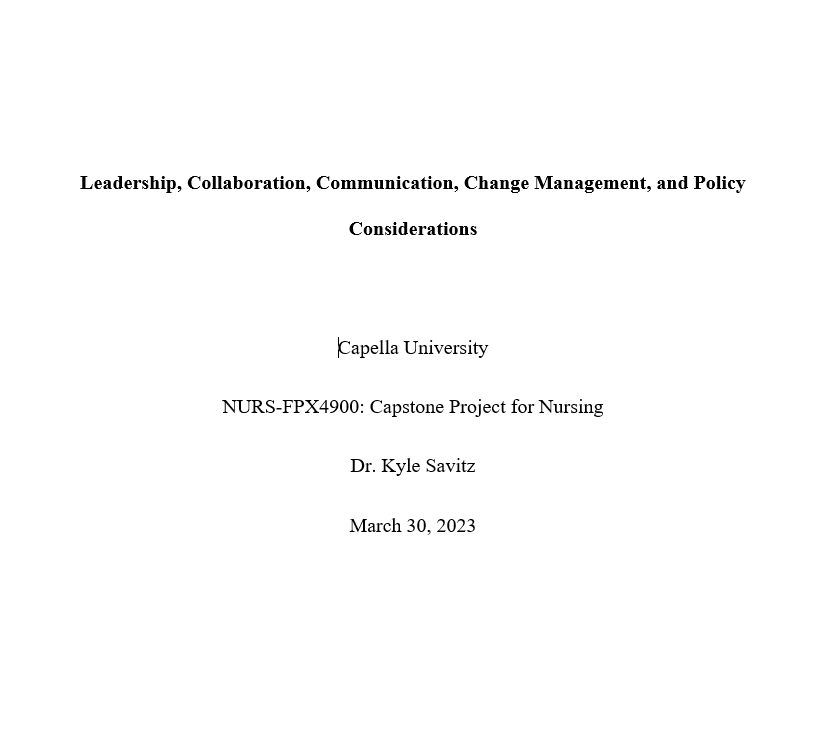Leadership, Collaboration, Communication, Change Management, and Policy Considerations
Capella University
NURS-FPX4900: Capstone Project for Nursing
Dr. Kyle Savitz
March 30, 2023
Leadership, Collaboration, Communication, Change Management, and Policy Considerations
Diabetes is among the major health threats facing the United States. CDC (2022) indicated that there are over 37 million people with diabetes. The disease is the seventh leading cause of death, hence the need for enhanced commitment to reducing cases, complications, and deaths. Health disparities expose low-income communities and some racial and ethnic minorities to diabetes and related complexities (CDC, 2022). Similarly, many people living with diabetes do not know their status. Others have poorly controlled or untreated diabetes, which exposes them to vision loss, kidney damage, and leg amputation. Timely interventions are necessary to reduce the risk of complications. For this project, the focus is on educating patients living with diabetes on self-management. Interviews with a social worker will provide insights into the various determinants of health and implications on individuals and populations’ health and quality of life.
Self-managing diabetes empowers patients to take charge of their health and well-being. The process includes identifying self-care practices such as exercise, self-monitoring of weight, and adherence to medications. This way, patients benefit from interventions designed to encourage positive health-seeking behaviors and attitudes. Similarly, patients and families identify cost-effective means of reducing the risk of delayed or postponed care. Schmitt et al. (2022) associated diabetes self-management with positive health-seeking behaviors and attitudes relevant for preventing delayed or postponed care. Schmitt et al. (2022) also emphasized the importance of diabetes self-management in reducing the risk of uncontrolled symptoms. This way, healthcare professionals initiate and maintain patient and family engagement for in-depth understanding of determinants of health and interventions necessary to optimize care outcomes. The efforts are vital in underserved and under-resourced communities disadvantaged by low-income, low health literacy, and lifestyles that expose individuals to undesirable disease progression. As a Bachelor’s prepared, this project provides opportunities to design and implement evidence-based and patient-centered practices. The objective is to encourage patients to embrace positive health-seeking behaviors and attitudes across care continuum. Patients and families will identify tailored self-care practices designed to reduce the risk of symptoms exacerbations.
Evidence Supporting Diabetes Self-Management
Credible and reliable sources allow healthcare professionals to make informed conclusions about viability of an intervention in improving quality, safety, and cost of care. The Currency, Relevance, Authority, Accuracy, and Purpose (CRAAP) framework provides insights into the need for nurse researchers to utilize current sources published within the last five years. The goal is to make informed conclusions from findings published by authors with credible scholarly and professionals credentials. Similarly, authors’ focus on self-management and related activities enable nurse researchers to make accurate and complete conclusions about strategies for improving health and quality of life.
Nurses could play critical roles in initiating and implementing evidence-based and patient-centered practices relevant for optimizing care outcomes. Nurse researchers understand determinants of health and dedicate themselves to identifying means of reducing health disparities. For this project, nurses’ roles include enhancing health promotion and education to enable patients living with diabetes access accurate and complete information about diabetes self-management. The aim is to motivate individuals to understand their roles and responsibilities toward identifying and adopting individualized care plans essential for improving health and quality of life.
This project utilizes evidence peer-reviewed evidence to make informed conclusions about diabetes self-management and implications on quality, cost, and safety of patient care. The credible and reliable sources provide insights into the need for patients and families from low-income communities to embrace cost-effective measures for improving standards of care. Non-pharmacological options remind patients about the need to take charge of their health and well-being (Schmitt et al., 2022). Individuals identify resources including, information, social support, and other non-medical essentials appropriate for improving health and quality of life. Self-management is a viable alternative for preventing severe symptoms. However, successful outcomes are achievable through increased health literacy. This way, scaling health promotion and education is a priority for healthcare professionals dedicated to empowering patients to embrace self-care practices.
Leading and Managing Change for Positive Health Outcomes
Successful diabetes management depends on efforts by health leaders to initiate programs associated with self-management and other meaningful practices. The leaders understand challenges within communities and interventions necessary to improve health and quality of life. For this project, the transformational approach is desirable based on ability to initiate people-centered activities. The style allows leaders to encourage team-based efforts characterized by enhanced commitment to implementing patient and family engagement and other interventions that encourage consistent adherence to self-care practices (Seljemo et al., 2020). The transformational leader also ensures that everyone within the care team fulfill their potential in terms of sharing experiences, knowledge, and skills and advocating for cost-effective measures relevant for reducing health disparities. For this project, the right leader will understand health burden associated with diabetes including, declining productivity, mental health issues, and high costs of medications and non-medical needs.
The transformational leader will also mobilize other primary care providers and specialists to identify resources designed to reduce health inequalities. The leader will discuss structural and systemic disparities. The discussion paves way for informed conclusions about measures such as a culturally and linguistically diverse workforce and convenient access to information relevant for encouraging diabetes self-management (Seljemo et al., 2020). The leader also understands trends in the healthcare sector including, new and advanced technologies designed to streamline patient care activities. For instance, the transformational leader appreciates the use of remote monitoring tools such as telehealth to access timely, accurate, and complete information on diabetes monitoring and management. Patients in remote locations have better access to primary and specialty care to enable them identify individualized care plans appropriate for improving health and quality of life.
The transformational leader understands the change process and the framework for ensuring everyone dedicates time and energy towards optimizing care outcomes. The people-centered approach allows the leader to encourage individual and team-based efforts necessary for scaling health promotion and education. This way, everyone appreciates diabetes self-management as a viable intervention that requires collective dedication to engaging patients and motivating them to exercise, eat healthy foods, monitor blood glucose levels, and adhere to recommended medications.
Communicating and Collaborating for Effective Diabetes Self-Management
Successful diabetes self-management depends on the care team’s commitment to creating a conducive environment for patients and families to share experiences about disease progress. The process entails understanding clients’ values and preferences for accurate and complete details of challenges and measures necessary to improve health and quality of life (Abdulrhim et al., 2021). This way, the care team initiates patient-centered and evidence-based plans that allow individuals to describe their symptoms, disease progress, and improvements necessary to achieve the intended outcomes. With excellent communication and collaboration, healthcare professionals implement patient education that matches clients’ needs and expectations. Understandable language empowers patients to recognize self-care practices such as tobacco use cessation, exercise, and self-monitoring of blood glucose levels as viable means of preventing undesirable disease progression (Abdulrhim et al., 2021). Similarly, patients have the freedom to discuss determinants of health, complications, and disparities that influence quality of life. The discussions pave way for in-depth understanding of patients’ knowledge and willingness to embrace self-management across the continuum.
Health Policies and Practice Standards for Diabetes Management
Health policies enable healthcare providers to respond effectively to negative determinants of health across communities. The Affordable Care Act is among the relevant legislations that promote integrated primary and specialty diabetes care. The policy emphasizes the need for efficient and effective practices intended to improve quality, safety, and cost of patient care (Myerson et al., 2019). For instance, patients and families benefit from community health teams responsible for providing comprehensive care, follow-ups, social support, and health promotion and education on effective self-care practices. Integrated efforts make primary care providers and specialists easily accessible by patients living with diabetes and their families (Myerson et al., 2019). For practice standards, nurses and the rest of the care team should strive to uphold compassion, empathy, and respect when handling patients disadvantaged by health disparities.
The National Committee for Quality Assurance provides guidelines for healthcare professionals to adhere to when responding patients and families’ demands. The agency encourages effective communication, collaboration, and cultural competence when delivering health services. The College of Registered Nurses of Prince Edward Island (2018) emphasized the need for patient care activities driven by shared decision-making to allow clients to express their preferences. The American Nursing Association also reminded nurses to accommodate patients’ values and preferences. Health promotion and education on diabetes self-management is among the practices that enable the care team to practice compassion, empathy, and excellent communication across the continuum.
Conclusion
Educating patients on diabetes self-management reduces the burden in terms of costs, emergency care visits, and challenges accessing primary care providers and specialists. Families and patients gain from reduced anxiety, tension, and worries associated with diabetes and related symptoms. Successful diabetes self-management also motivates patients to acknowledge calls for enhanced utilization of health resources across the care continuum.
References
Abdulrhim, S., Sankaralingam, S., Ibrahim, M., Diab, M., Hussain, M., Raey, H., Ismail, M., & Awaisu, A. (2021). Collaborative care model for diabetes in primary care settings in Qatar: A qualitative exploration among healthcare professionals and patients who experienced the service. BMC Health Services Research, 21(1), 1-12. https://pubmed.ncbi.nlm.nih.gov/33653324/
CDC. (2022). National diabetes statistics report: Estimates of diabetes and its burden in the United States. U.S. Department of Health & Human Services. https://www.cdc.gov/diabetes/data/statistics-report/index.html
College of Registered Nurses of Prince Edward Island. (2018). Standards for nursing practice. https://immediac.blob.core.windows.net/crnpei/pdf/Standards%20for%20Nursing%20Practice%20December%202018.pdf
Myerson, R., Romley, J., Chiou, T., Peters, A. & Goldman, D. (2019). The Affordable Care Act and health insurance coverage among people with diagnosed and undiagnosed diabetes: Data from the National Health and Nutrition Examination Survey. Diabetes Care, 42(11), 170-180. https://diabetesjournals.org/care/article/42/11/e179/36343/The-Affordable-Care-Act-and-Health-Insurance
Seljemo, C., Viksveen, P., & Ree, E. (2020). The role of transformational leadership, job demands and job resources for patient safety culture in Norwegian nursing homes: A cross-sectional study. BMC Health Services Research, 20(799), 1-7. https://bmchealthservres.biomedcentral.com/articles/10.1186/s12913-020-05671-y
Schmitt, A., Kulzer, B., Ehrmann, D., Haak, T., & Hermanns, N. (2022). A self-report measure of diabetes self-management for type 1 and type 2 diabetes: The diabetes self-management questionnaire-revised (DSMQ-R)-Clinimetric evidence from five studies. Frontiers in Clinical Diabetes and Healthcare, 2, 1-14. https://www.frontiersin.org/articles/10.3389/fcdhc.2021.823046/full



